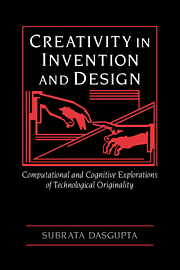Crossref Citations
This Book has been
cited by the following publications. This list is generated based on data provided by Crossref.
Dasgupta, Subrata
1994.
Understanding design: Artificial intelligence as an explanatory paradigm.
Sadhana,
Vol. 19,
Issue. 1,
p.
5.
Soloviev, A.N.
and
Stempkovsky, A.L.
1995.
Model of conceptual design of complex electronic systems.
p.
302.
Mostov, K.S.
and
Soloviev, A.N.
1995.
Conceptual design of complex electronic systems.
Vol. 2,
Issue. ,
p.
1837.
Chen, Zhengxin
1999.
Wiley Encyclopedia of Electrical and Electronics Engineering.
Kidd, Laura K.
and
Workman, Jane E.
1999.
Assessment of Creativity in Apparel Design.
Clothing and Textiles Research Journal,
Vol. 17,
Issue. 1,
p.
58.
Goldenberg, Jacob
Mazursky, David
and
Solomon, Sorin
1999.
The Fundamental Templates of Quality Ads.
Marketing Science,
Vol. 18,
Issue. 3,
p.
333.
Goldenberg, Jacob
Mazursky, David
and
Solomon, Sorin
1999.
Toward Identifying the Inventive Templates of New Products: A Channeled Ideation Approach.
Journal of Marketing Research,
Vol. 36,
Issue. 2,
p.
200.
Maimon, O.Z.
and
Horowitz, R.
1999.
Sufficient conditions for inventive solutions.
IEEE Transactions on Systems, Man and Cybernetics, Part C (Applications and Reviews),
Vol. 29,
Issue. 3,
p.
349.
Redelinghuys, C.
2000.
Proposed criteria for the detection of invention in engineering design.
Journal of Engineering Design,
Vol. 11,
Issue. 3,
p.
265.
Gow, Gordon
2001.
Spatial Metaphor in the Work of Marshall McLuhan.
Canadian Journal of Communication,
Vol. 26,
Issue. 4,
p.
63.
Johar, Gita Venkataramani
Holbrook, Morris B.
and
Stern, Barbara B.
2001.
The Role of Myth in Creative Advertising Design: Theory, Process and Outcome.
Journal of Advertising,
Vol. 30,
Issue. 2,
p.
1.
Waks, Shlomo
and
Merdler, Moti
2003.
Creative Thinking of Practical Engineering Students During a Design Project.
Research in Science & Technological Education,
Vol. 21,
Issue. 1,
p.
101.
SIM, SIANG KOK
and
DUFFY, ALEX H.B.
2004.
Knowledge transformers: A link between learning and creativity.
Artificial Intelligence for Engineering Design, Analysis and Manufacturing,
Vol. 18,
Issue. 3,
p.
271.
Jin Chen
Fang-zhen Yu
Liang Tong
and
Jin-hong Xie
2005.
The quantitative research of university original technological innovation: based on chinese university study.
Vol. 2,
Issue. ,
p.
751.
Brown, David C
2005.
Design process improvement.
p.
158.
Gorman, Michael E.
2006.
Scientific and Technological Thinking.
Review of General Psychology,
Vol. 10,
Issue. 2,
p.
113.
Kijkuit, Bob
and
Van Den Ende, Jan
2007.
The Organizational Life of an Idea: Integrating Social Network, Creativity and Decision‐Making Perspectives*.
Journal of Management Studies,
Vol. 44,
Issue. 6,
p.
863.
Duhon, H. J.
and
Elias, J. S.
2008.
Why It Is Difficult To Learn Lessons: Insights From Decision Theory and Cognitive Science.
SPE Projects, Facilities & Construction,
Vol. 3,
Issue. 03,
p.
1.
BAR-ELI, MICHAEL
LOWENGART, ODED
TSUKAHARA, MITSUO
and
FOSBURY, RICHARD DOUGLAS
2008.
TSUKAHARA'S VAULT AND FOSBURY'S FLOP: A COMPARATIVE ANALYSIS OF TWO GREAT INVENTIONS.
International Journal of Innovation Management,
Vol. 12,
Issue. 01,
p.
21.
FILLIS, IAN
and
RENTSCHLER, RUTH
2010.
THE ROLE OF CREATIVITY IN ENTREPRENEURSHIP.
Journal of Enterprising Culture,
Vol. 18,
Issue. 01,
p.
49.





